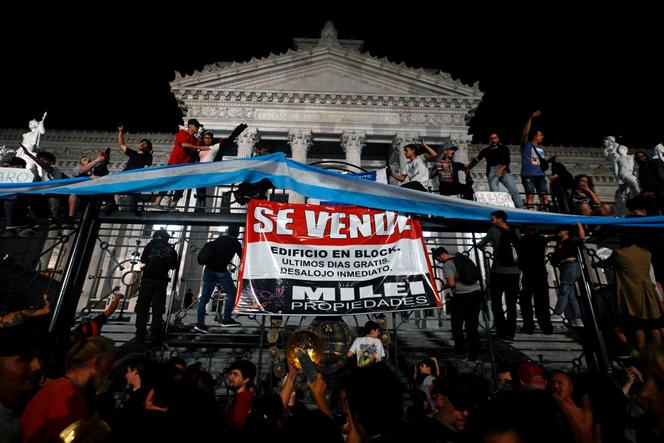


"Down with Milei's austerity program," "Repression is no answer to hunger and misery:" Under the banners of various social, political and trade union organizations, thousands of people marched through Buenos Aires on Wednesday, December 20. Coming 10 days after anti-establishment president Javier Milei took office, the rally was a test. It arrived at a time when the "shock treatment" promised by Milei was taking shape, through an avalanche of measures and a tightening of security.
The government set the tone for this big day. As protestors poured into the center of the Argentine capital, Milei went to the federal police headquarters to watch live footage from the city's streets. A video of the president looking absorbed was quickly broadcast. He was accompanied by Karina Milei, his sister and Secretary General of the President, and Patricia Bullrich, Minister of Security. The police presence in the streets was disproportionate to the number of demonstrators. According to the Clarín newspaper, some 5,000 police and gendarmes were on hand to maintain order.
At the end of the day, Bullrich welcomed the "totally reduced number" of demonstrators. The Partido Obrero (the "Workers' Party," who had called for the protest) reported violence committed by the police on a portion of the route. According to the party, this type of "repression" had not been seen in the capital for several years.
On December 14, Bullrich announced a series of anti-demonstration measures aimed specifically at road closures. In Argentina, picketing is a common form of social protest. "It's time to put an end to this method, which only creates total and absolute disorder" in terms of road traffic, declared the security minister. Police and gendarmes are now called upon to "intervene" in the face of pickets, using "force (...) proportionate to the resistance." Sanctions have also been announced against adults taking children to demonstrations. In addition, organizers will have to bear the cost of the security arrangements deployed at demonstrations.
The government's deterrent measures went even further. On Monday, Sandra Pettovello, the minister of human capital (comprising labor, social affairs and education), warned that protesters blocking a street or road will have their benefits suspended. This was a quick way of targeting unemployed Argentines and workers without contracts, who make up the 40% of the population living in poverty.
"These announcements are serious, alarming and unprecedented in 40 years of democracy," said Victoria Darraidou, a security specialist at the Centro de Estudios Legales y Sociales, a human rights organization. "They open the door to repression and are unconstitutional because they run counter to the right to demonstrate." The measures, which are difficult to enforce, are above all intended to send a political message. They seek to limit social protest, while satisfying the public's expectation of powerful security policies. According to a recent University of Buenos Aires poll, 65% of Argentines are in favor of a ban on road closures.
You have 45% of this article left to read. The rest is for subscribers only.
